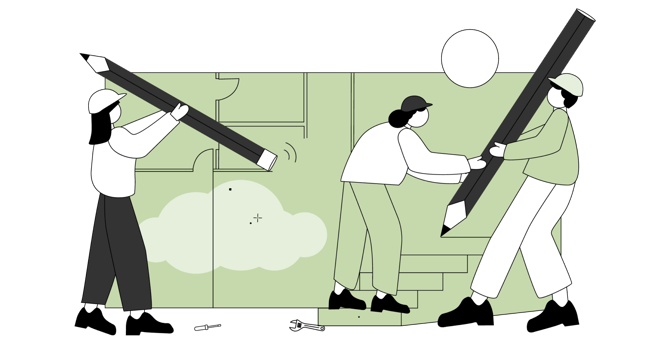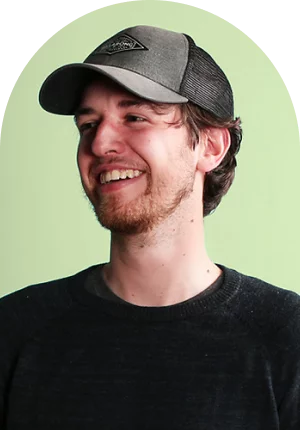When you think development, the first image that comes to mind is innovative tech and hot new apps; Mathieu Gamache, however, thinks about the people around him. For him, development is working together to overcome any challenge and building a team that supports every one of its members, both professionally and personally. With ShareGate Apricot, he’s found his community.
Team first
Our industry was founded on innovation and improvement; it’s easy, then, to get carried away by new technologies and ways of doing things. All too often, teams are too busy imposing the newest agile methodology to take the time to consider their group’s actual needs.
Having gone from a career path in electrical engineering to programming, it was the respective company cultures he experienced during his internships that convinced Mathieu to become a dev. Between working in the corner cubicle of a huge corporation and being an integral part of a team from his first day aboard, the choice was easy. Leaving behind the shirt and tie for a pair of jeans and a t-shirt, he found not only his desired workspace, more creative and open to initiative, but he also found himself engaged with the projects and products he was most interested in.
“At the end of the day, whether it’s a video game, a web app, dev tools or launching a rocket to the moon, the most exciting technology stack in the world isn’t going to be enough. If the team isn’t a fit for you, you’re going to have some long days ahead of you…”
Mathieu Gamache
Full-Stack Developer at ShareGate Apricot
Teamwork is work
It’s not that he’s indifferent to his work. On the contrary, he loves the dev work at the heart of small teams in the start-up world: the role of a generalist, fresh challenges every day and the autonomy to follow one’s own initiative. At Apricot, Mathieu might spend the morning in design meetings before putting on his detective’s cap and figuring out how to solve a client issue that’s been flagged. These diverse experiences all end up adding to his dev toolbox, ready to be repurposed for future opportunities.
But he’s always got an eye for improvement and team solidarity. When Apricot was launched, the team’s expertise was very much back-end oriented. With a few colleagues, Mathieu started a little “front-end community” to establish a solid foundation in the field and to rapidly share these competencies across the team.
Along the same lines, the first Thursday of the month is now the Code-and-Beer, freestyle soirées where the devs can get together to explore the far corners of their craft not always permitted by the demands of the 9-to-5. The second Thursday is even more laid-back: it’s Coquetel hour, a mixological expedition that has evolved with the times into work-from-home hashtags like #Coqstagram and #Coqlympics.
What projects have you got going?
“Emerging from talks in our front-end community, we decided to migrate our code from JavaScript to TypeScript. It was crucial that this refactor had a minimal impact on feature delivery, so we had to think hard about migration strategies for such a change.
The advantage of TypeScript and JavaScript is that they can operate alongside each other, which opened the door for a progressive transition. After having modified the app’s bootstrap to support TypeScript and giving a bootcamp training to the devs, we were ready to go!
The rules were simple: if you implement a new feature, it happens in TypeScript. If you make a significant change to an existing file, you migrate it to TypeScript. The last time I checked, our codebase is now 80% Typescript; the client never noticed a thing and our devs are finding life just that much simpler!”
Teams - Workleap
Though he’s certainly got the skills for a career in event planning, Mathieu is laser-focused on the needs of his team: “you have to find the right balance between fun and ROI. At Workleap, we’re always game for new ideas, as long as you can demonstrate the return. Last year, we organized a hackathon that doubled as training on machine learning.”

Team cohesion is often treated as a shortcut to productivity, as though devs were another resource to maximize. For Mathieu, though, “it’s the most important factor in wanting to come to work in the morning,” and it’s impossible not to believe him when he talks about the Scopa lunches, Clark Thursdays, team retrospectives or the new effort to provide regular inter-peer feedback to complement the manager’s annual review.
In the constant search for performance, it’s easy enough to lose sight of the fact that the product exists in a symbiotic relationship with the human needs of the team, not in opposition. For Mathieu, development is as much about taking care of one’s team as it is about chasing down bugs or delivering new features to production.

